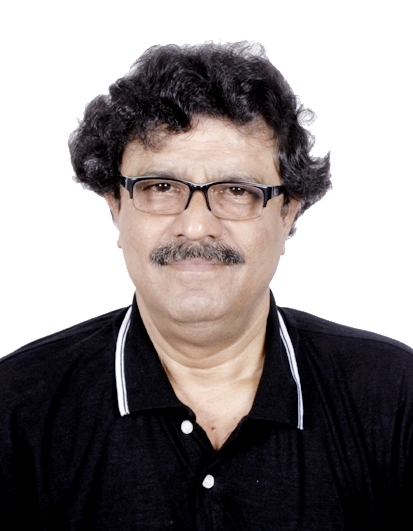Sourish Roy
– ‘Did it finally!’
– ‘Wow!’
– ‘What do you youngsters think? Do you think we’re too old for these things? Even we can place orders on the phone!’
– ‘But when did you learn all these? You did not say a word about it, and I was thinking I should help you with this when I would be back home!’
– ‘Ah-ha-ha! Why only you? I also have the right to surprise you!’
– ‘Really Baba, you’ve left me impressed!’
– ‘Okay, okay. Listen, I think I’ve chosen the best one for you. Maybe, by now it’s already at your doorstep.’
– ‘But Baba… what was its need?’
– ‘No ifs and buts. I am sure you will like it.’
*
– ‘No, I won’t like it. Won’t like it at all!’
– ‘What did you say?’
– ‘You have heard it correct. I don’t like unnecessary changes in my life, nor won’t I like if we have to travel that far only for shopping!… What’s wrong in getting the shopping done in the local market as we have been doing for years?’ said the ‘antiquarian’ man who was always full of eulogy of the ‘glorious past’.
– ‘No, this won’t do any more! You only tell me we are going to the city or not…!’ and the stubborn feminine wail of dissatisfaction doubled in intensity to further embarrass the man.
– ‘Okay, okay! One has to learn from you how to get things done at a whim!’ and thus, the failingly grudging man had to eventually give in to the obstinacy of her wife, and that is how that year the man, my ever-cautious past-loving Baba and the innocently indiscrete lady, my Maa happened to conclude that we were going to the city to do the puja shopping.
Of course, the pre-puja preparations in the city were going to leave me mesmerised for long, not sure though whether it was going to have any such effect on my frock-clad impeccant bunu and lap-bound toddler bhaai.
On the scheduled day, decades back, we five got off the train in the afternoon. But the shopping hub of the city was still a few kilometres away from the railway station. So, we hired a man-pedalled rickshaw to take us there.
Baba–Maa seated on the cushion, I sat astride on Baba’s lap, bhaai held tight to Maa’s side, and bunu standing on the footboard right in front, began to relish our first ever ride deep into the essence of urbanism. Perhaps, Baba too had started liking it at last. The hood of the rickshaw drawn backward let the visuals all around catch up with our keen attention.
When we were still well of a kilometre away from the city centre, the far-away towering buildings among the traditional duplex and triplex residential buildings alongside the high-rising skyscrapers were getting me awed in flummoxed admiration on learning that any such multiplex residency could actually be possible!
Stately buildings, red-crossed hospitals, flashy billboards and banners stuck on the roofs and attics of the tall houses, enlarged graphics of heroes and villains fighting in front of cinema halls, ornated and embellished facades on the verge of the streets and lanes, edifices adorned with décor and modern exterior paints, and also the up-going gigantic collonaded bamboo structures of puja pandals draped in gorgeous fabrics projecting magnitude and luxury here and there, series of temporary impressive lighted scaffolds, stands and arches erected on either side of the major roads and streets leading up to the magnificent puja committees – all encapsulating the vibrant and scintillating city life, kept slowly but steadily guiding our ride towards our destination, the renowned cloth stores of the city.
It might have been a common sight for a life-long city dweller with mere five days to go before the bodhon – ethereal summoning and awakening of Maa Durga on Shoshthi, but it was something majestic, something ceremonial for us, the first-timers in the pre-puja season of shopping: it all seemed as if we, a lean lanky stream, were passing through a deep valley while the lofty buildings and other concrete structures on both sides had formed the raised barriers keeping us well on our course. To my imaginative cognition, the falling-over rows of the ever-rising cemented walls on either side of the road had in a way raised the land-formation quite similar to the one in my geography book – a river canyon.
Our rickshaw, well-poised in the moving trail sanctioned for the man-pedalled tri-wheelers, trundled past the shop-bound flood of men and women and children all around, all oozing out the delight in expectation of buying the best and most preferably the singular one among all. Most certainly, given the languidly pace, it felt for a moment that the bipedal deluge of clients cared very little whether it could ever reach in time the enterprising estuaries it was heading for.
At some distance right ahead, the hairy stream got bifurcated – one, went to the left, and the other, the larger one, went straight on its way. But it rather seemed the one from the left was pouring into the mainstream, and then it created an intense whirl of conundrum and clamour and confusion of all sorts right there at the junction point. As a result, light-weight motor vehicles standing side-by-side the autos and scooters got stuck with no option of return as clusters of many more of their kinds kept thrashing hard from behind – a complete logjam, a complete mess and total disarray!
Blaring sirens and honking horns and blowing whistles deafening every possible ear around, babies crying with utmost disgust, children sounding distraught, women disgorging vehemence at men, men shouting at the non-functionality of the malfunctional traffic system, and all altogether cursing the traffic personnel, the police in general, the whole administration, the bribe sucking politicians, the closure of industries in the state, the declining economy of the nation. Thus, the chorus verbal jibes, and unspeakable abuses cumulatively produced a deep gushing noise of fury that might break free any moment.
As feared, suddenly when people from behind could no longer advance on the way, one or two voices pressed the repulsive button: “Maaro, maaro shaalaa-ke – beat the bastard to death!” And thus, the status-quo collapsed miserably at one tug of a misdemeanor. As the pretence of tolerance gave up, vulnerability got them all in its grip, and in the wink of an eye, a mere common struggle for foothold turned a gruesome fight for life.
Although, it was not known as to how it started, what happened thereafter was to leave a permanent mark upon my conscience: that moment I perceived how precariously delicate was the human’s sense of harmony.
In the meantime, people had started rushing for safety as khaaki batons and truncheons were banging upon whoever was nearby. Men pushing men, men pulling women, women safeguarding children, children clinging to toys, and toys perilously hanging from the innocent grasps – all seemed to be running from the heavy blows of the suddenly aroused peacekeepers: the heavy and sudden fall of some unruly obstruction caused such an agitation in the current of the free-flowing river that the swelling volume of water lifted off gigantic drifts to send out wavelets, gushing back and forth to inundate the marshes nearby.
Maa with bunu held tight in her hand and bhaai in her lap, had somehow managed to get off to safety behind the shield of the seasoned stem of a roadside tree. She was already terrified by the suddenness of turn of events and bunu, apprehensive of some imminent danger, was crying at the highest possible shrillness of her voice, while the human figures caught in a mad rush minded the least about them.
Baba had long got off the rickshaw and was about to reach out for me with his outstretched arms. But just then one running man fell on him, and he fell on the tarred bed of the street. And then, many more men kept coming on to him. I saw Baba getting bruised badly by the frightened dash of feet of an on-rushing clueless herd of men. I feared Baba might never get up as he was still struggling hard against the stampede: he might get trampled under feet!
I could see it no more and began to cry: “Baba… Baba… Baba!”
Next time I opened my eyes when I was picked up by heavily bleeding Baba after some time.
I was still crying when Baba took me to Maa, bunu and bhaai – only, still can’t decide whether it was the tears of relief or disbelief.
While a few yards away, an infant, caught in this panic-stricken swirl of chaos, was desperately trying to reach out to his father, Baba, now exhausted and contused all over with long heavy breaths, could only say: “Jongol, ekhono jongole baas kori jeno – as if, we still live in the jungle! Won’t have been any worse in the deepest recess of the Amazon! At least, life would have been far easier, above all… hassle-free!”
In the end, utterly dejected at uncultured urbanism and shattered at heart, we, the five simple rural beings, went back home empty-handed.
*
And now, decades later, sitting at my faraway metropolitan abode, I am opening the package of clothes Baba ordered for me online.
After all, it’s puja time yet again.
Everything is quite the same. Only, fortunately, or unfortunately, that much-feared fanatic stream of over-enthusiastic shoppers is missing here.
Above all, Baba did not require that much of my support to place the order.
————–

Shamol Nath is a writter & Documentary film Director. Shamol Nath Write and made documetaries over the decade.
He mainly focus on literature and films. Write poems, story, eassy and recently write a novel etc.


